Low Carb Breckenridge 2017 Day 3
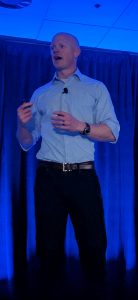 The day started off with a very interesting presentation from Dr. Ben Bikman a research biologist and expert on insulin and it’s effects on fat. He addressed the age old question of why do people lose more weight on a low carb diet. The answer lies in the 2 types of fat in all mammalian bodies, brown fat and white fat. The purpose of brown fat is to keep us warm. He pointed out something I, who used to do newborn physicals as a Family Doctor can confirm but had never consciously noted before. Babies don’t shiver. Why? He explained it’s because they have a lot of brown fat. The way brown fat works is that there is a chemical switch in the mitochondria called Thermogenin ( also called uncoupling protein by its discoverers and now known as uncoupling protein 1, or UCP1) that when flipped on causes all the energy produced by burning fat, ketones, glucose, amino acids or lactate to go to producing heat. It turns out that white fat can act like brown fat and burn calories for heat also, increasing our metabolic rate but much more likely to do so only when insulin levels are low. Also being in ketosis and burning ketones causes white fat to activate thermogenin and increase the bodies metabolic rate, essentially “wasting” some of the calories you eat as heat rather than storing them as fat. He has proven this by growing human white fat in cell culture then feeding it ketones and measuring the metabolic rate, what an elegant experiment.
The day started off with a very interesting presentation from Dr. Ben Bikman a research biologist and expert on insulin and it’s effects on fat. He addressed the age old question of why do people lose more weight on a low carb diet. The answer lies in the 2 types of fat in all mammalian bodies, brown fat and white fat. The purpose of brown fat is to keep us warm. He pointed out something I, who used to do newborn physicals as a Family Doctor can confirm but had never consciously noted before. Babies don’t shiver. Why? He explained it’s because they have a lot of brown fat. The way brown fat works is that there is a chemical switch in the mitochondria called Thermogenin ( also called uncoupling protein by its discoverers and now known as uncoupling protein 1, or UCP1) that when flipped on causes all the energy produced by burning fat, ketones, glucose, amino acids or lactate to go to producing heat. It turns out that white fat can act like brown fat and burn calories for heat also, increasing our metabolic rate but much more likely to do so only when insulin levels are low. Also being in ketosis and burning ketones causes white fat to activate thermogenin and increase the bodies metabolic rate, essentially “wasting” some of the calories you eat as heat rather than storing them as fat. He has proven this by growing human white fat in cell culture then feeding it ketones and measuring the metabolic rate, what an elegant experiment.
An added bonus of being in ketosis is that when the fat we eat is converted to ketones bodies in the liver many calories are wasted by 2 other mechanisms than being burned for heat. First, a spontaneous breakdown product of two of the ketone bodies, Acetoacetate and Betahydroxybutyrate is Acetone. Acetone cannot be burned by the body and is eliminated mostly through the lungs in gaseous form. Thus calories are lost that would have been burned on a high carb diet . The second mechanism is that the body is not as good at avoiding the loss of the powerful fuels acetoacetate and betahydroxybutyrate in the kidneys as it is glucose so many calories are lost in the urine. Thus the “A calorie is only a calorie” that Coca Cola would like you to believe, simply isn’t true. A calorie from a coke is much more likely to wind up as fat in your liver making you sick than a calorie from butter, some of whose energy you may waste as heat, breath out as acetone or send down the toilet as acetoacetate or betahydroxybutyrate. Bravo, Dr. Bikman.
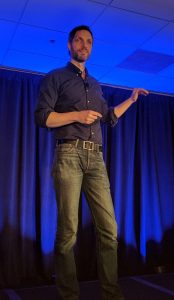 Next came Dr. Andreas Eenfeldt. He gave a presentation on how he has used the internet and blogging to help make the Low Carb, High Fat diet (LCHF) available to people all over the world.
Next came Dr. Andreas Eenfeldt. He gave a presentation on how he has used the internet and blogging to help make the Low Carb, High Fat diet (LCHF) available to people all over the world.
He pointed to the many successes in Sweden where since the LCHF revolution started in 2007 butter consumption is back to historical levels and obesity is way down. My favorite quote from Andreas went something like this: “It’s not LCHF diet that is a fad diet it’s the Low Fat Diet that is a fad!”
His blog is now the largest low carb blog in the world with 200,000 hits a day (often me). On his blog you can find “how to” information, videos, recipes and much more at no cost.
For a small fee you can receive extras like meal plans, low-carb TV and ask the experts (your questions answered). His site is www.DietDoctor.com. You can see a video presentation similar to the one he gave by clicking this link. When I talk to people who are not interested in following me down the Zero Carb path, I often recommend Dr. Eenfeldt.
Dr. Gary Fettke followed and managed to get an amazing amount of great information into 30 minutes. I’ll try to get all the highlights in. He started out with his battle cry which essentially the same as the labels on the slides show on the landing page of my blog. “Sugar makes you hungry, carbohydrates make you fat and polyunsaturated oils make you inflamed and sick.” Amen!
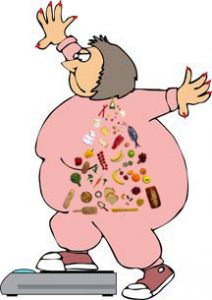 I loved his analogy that eating carbs was like “putting diesel fuel in a car that burns petrol.” He got straight to the heart of what’s wrong with the current recommendations based on “nutrition science”. He said “Nutrition science” is not the same as “Medical Science” because they haven’t held themselves to the same standard before making therapeutic recommendations. Then let go another zinger. “If you eat by the food pyramid, you’ll die by the food pyramid and look like the food pyramid while alive.”
I loved his analogy that eating carbs was like “putting diesel fuel in a car that burns petrol.” He got straight to the heart of what’s wrong with the current recommendations based on “nutrition science”. He said “Nutrition science” is not the same as “Medical Science” because they haven’t held themselves to the same standard before making therapeutic recommendations. Then let go another zinger. “If you eat by the food pyramid, you’ll die by the food pyramid and look like the food pyramid while alive.”
He bemoaned the fact that with some many disease in which a dietary change could make such a difference modern medicine practitioners didn’t seem very interested in learning or applying these therapies. He feels that inflammation is the underlying destructive process in so many of the chronic disease and a low carb, high fat diet lowers inflammation in so many ways. Other factors that should be pursued before resorting to medication or surgery should include: exercise, sleep hygiene, Vitamin D if latitude and longitude or artificial lighting are a problem.
He pointed out many reasons why fructose is so toxic to our bodies, especially one that is not often talked about and that is that some of the fructose is converted to Uric Acid which interferes with the production of Nitrous Oxide which leads to hypertension by preventing dilation of arteries and makes it difficult for our white blood cells gracefully do the 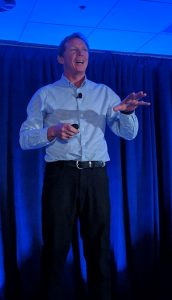 amoeboid movements they must do to protect us from infectious diseases as this process relies on Nitrous Oxide. I knew that a certain percent of the glucose we ate was turned into toxic fructose through the Polyol Pathway, but I didn’t know how much. He cited a study that showed it was normally about 3% but in type 2 diabetics it could reach as high as 30%. Probably a big reason the blood pressure goes up with the metabolic syndrome.
amoeboid movements they must do to protect us from infectious diseases as this process relies on Nitrous Oxide. I knew that a certain percent of the glucose we ate was turned into toxic fructose through the Polyol Pathway, but I didn’t know how much. He cited a study that showed it was normally about 3% but in type 2 diabetics it could reach as high as 30%. Probably a big reason the blood pressure goes up with the metabolic syndrome.
He had theory that I thought was quite elegant that the polyunsaturated oils were responsible for much of the arterial damage that led to heart attacks. The facts are that the unsaturated bonds in polyunsaturated oils are highly susceptible to oxidation at which point they become inflammatory in our bodies. That’s why they go rancid so easily There are studies that show the more of the polyunsaturated oils a person eats, the higher their concentration will be in the lining of that persons arteries. They can certainly become oxidized and inflammatory while they are there and may become the trigger that starts the repair cascade where LDL Cholesterol particles are deposited and White Blood Cells are summoned. If those LDL particles are oxidized themselves as they are more likely to be in carb eaters you’ve got a lot of inflammation going on in a place where you don’t want it.
His recommendation was for people to eat local, seasonal, natural, “real food” in a mindful manner. A very wise and courageous man who I greatly admire.
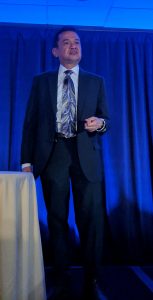 Thank you Antonio Martinez for sharing your knowledge and giving us all some hope. He was able to do this because of his experience as both a lawyer and political lobbyist. He gave us a peek at what really goes on in legislatures and congresses and showed that if we wanted to get our message heard by law makers that we needed to organize ourselves and explain to lawmakers how the changes we are seeking are going to lower government health care costs because the budget is always a top priority for lawmakers. And organized groups are able to raise money which unfortunately is often necessary to gain access to these decision makers as it costs them a lot of money to run their campaigns for reelection. It was a well received and valuable talk.
Thank you Antonio Martinez for sharing your knowledge and giving us all some hope. He was able to do this because of his experience as both a lawyer and political lobbyist. He gave us a peek at what really goes on in legislatures and congresses and showed that if we wanted to get our message heard by law makers that we needed to organize ourselves and explain to lawmakers how the changes we are seeking are going to lower government health care costs because the budget is always a top priority for lawmakers. And organized groups are able to raise money which unfortunately is often necessary to gain access to these decision makers as it costs them a lot of money to run their campaigns for reelection. It was a well received and valuable talk.
In the question and answer session, he gave us all hope by letting us know that Ivanka Trump is a low carber.
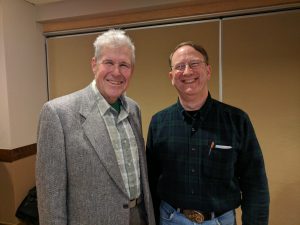 Next came someone I now call a friend, Dr. Peter Ballerstedt (the old guy on the left is me and the handsome guy on the right is Peter). His PhD is in Forage management and Utilization and ruminant nutrition. He now travels the country educating ranchers on the benefits of beef and techniques for sustainable, ecologically friendly cattle production. The biggest point he made is that 25% of the available land on our planet is “range land” which does not lend itself well to plant cultivation and the land is damaged when used for this purpose for prolonged periods. His passion is to “use land that cannot produce crops to provide high quality food while healing the land and improving the environment” (by raising ruminants like cattle on it.).
Next came someone I now call a friend, Dr. Peter Ballerstedt (the old guy on the left is me and the handsome guy on the right is Peter). His PhD is in Forage management and Utilization and ruminant nutrition. He now travels the country educating ranchers on the benefits of beef and techniques for sustainable, ecologically friendly cattle production. The biggest point he made is that 25% of the available land on our planet is “range land” which does not lend itself well to plant cultivation and the land is damaged when used for this purpose for prolonged periods. His passion is to “use land that cannot produce crops to provide high quality food while healing the land and improving the environment” (by raising ruminants like cattle on it.).
Here are some of my favorite quotes from his lecture: “We enjoy the comfort of opinion without the discomfort of thought (JFK)” “You can tell when idols are being worshiped because people are being sacrificed” and “We evolved because we ate meat!”
He pointed out that beef was a more efficient food source than chicken or port because for every pound of plant protein they ate you got 1 pound of animal protein or 2 pounds of milk protein. He went on to show how much of the nutritional data showing plants are high in protein are incorrect because in the testing all nitrogen was considered to represent protein and there are many other nitrogenous substances in plants.
Another point he made was that their are many anti-nutrients in plants like phytates and lectins and none in beef. The cows eat these plant poisons which are then detoxified in the cows rumin by bacteria.
He pointed out that cows take CO2 out of the atmosphere and put it into the soil. And since the ground remains covered with grass water is retained in the soil and there is less erosion helping the environment when compared to industrial farming. Thank you Peter for doing what you do, I wish there were some way we could clone about a 1000 copies of you!
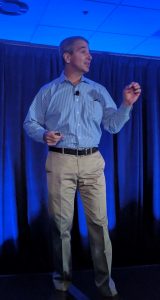 We then had our co-host Dr. Peter Gerber another fellow Board Certified Family Medicine physician. He like Dr. Westman has taken the art treating patient with a low carb, high fat diet to a high art form. His focus today was how it effects the Cholesterol and whether that was important. He started by saying that in 1986 the National Cholesterol Education Program (NCEP) had “declared war on Cholesterol” and that it seemed like a cold war to him. He expressed his sadness that despite the fact that the link between eating saturated fat and developing heart disease had now been thoroughly discredited, so many healthcare providers still believed it to be true because of brainwashing from the NCEP.
We then had our co-host Dr. Peter Gerber another fellow Board Certified Family Medicine physician. He like Dr. Westman has taken the art treating patient with a low carb, high fat diet to a high art form. His focus today was how it effects the Cholesterol and whether that was important. He started by saying that in 1986 the National Cholesterol Education Program (NCEP) had “declared war on Cholesterol” and that it seemed like a cold war to him. He expressed his sadness that despite the fact that the link between eating saturated fat and developing heart disease had now been thoroughly discredited, so many healthcare providers still believed it to be true because of brainwashing from the NCEP.
He felt that statins were overused to the detriment of patients. He pointed out that when used for primary prevention of heart disease they reduced the absolute risk by 1% or less. He feels, as many doctors do that they have more side effects than the FDA and producers are willing to admit and that they interfere with the adoption of dietary therapies like LCHF that might well have a much higher benefit if tested.
One effect for many people on a low carb, high fat diet is that the total and LDL Cholesterol and the LDL particle count can go up dramatically. He did not feel this was necessarily dangerous and would often not use a statin in this situation if other markers were going the right direction and that it was important treat the whole situation not just one lab test.
He said his goal was to continue to be a part of the established medical system and work for change from within. He shared billing codes he used and tips for doctors that want to do the same. A very valuable part of the program for practicing healthcare providers.
I wrote down some highlights from the Q&A session:
-
There was general consensus that taking exogenous ketones like MCT oil and drinks containing ketone powder was only helpful for extreme endurance sports athletes but were not likely to be helpful and could potentially be harmful if taken to treat diabetes or obesity.
-
One person said that eating just a small amount of sausage made her feel warm. Another person said the same for butter. Dr. Bikman pointed out that eating fat releases Cholecystokinin (CCK) which among other things induced fat cells to uncouple and produce heat.
-
One of the benefits that all the doctors on the panel agreed on was that type-1 diabetics that went low carb was at a lower risk than if they didn’t of developing “double diabetes” or developing the metabolic syndrome on top of their auto-immune induced beta-cell dysfunction which all too commonly happens with sometimes catastrophic consequences.
-
Someone asked about hair loss on Low Carb. The consensus was that any time you lose weight for any reason you will lose some hair but it is transient and will come back when the weight stabilizes.
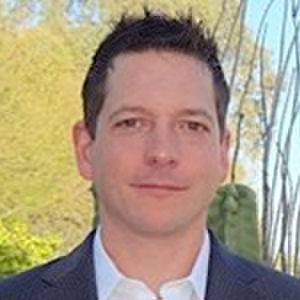 David Korsunsky was the next speaker. He is the Founder and CEO of Heads Up Health a digital health company committed to empowering others to change their lives through personalized health analytics. He has developed a sophisticated web service where people can store their entire health history in the cloud. It makes it very easy to see positive and negative trends.
David Korsunsky was the next speaker. He is the Founder and CEO of Heads Up Health a digital health company committed to empowering others to change their lives through personalized health analytics. He has developed a sophisticated web service where people can store their entire health history in the cloud. It makes it very easy to see positive and negative trends.
He has a wealth of health data and many clients have agreed to let their data be used anonymously for scientific studies which are now being initiated. Hopefully much good will come from this treasure trove some day. There are more specifics on their website.
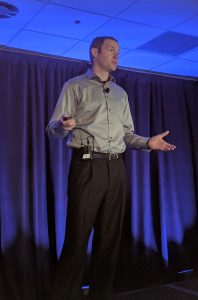 The penultimate speaker was yet another engineer showing the doctors up. Dave Feldman got the usual health benefits when he went LCHF but as all good engineers he kept close track of the available metrics. One troubling metric was his Cholesterol panel. The HDL and triglycerides went in the right direction but the Total Cholesterol, LDL Cholesterol and the LDL particle count all climbed to heights that would make a Cardiologist faint. He did extensive research and decided that indeed the main function of LDL Cholesterol was to carry fat to and from cells that needed fuel but it also had other functions including repair of damaged tissue. Thus since in heart disease there is obvious damage to the arterial lining the association of high Cholesterol with heart attack could not be proven as the Cholesterol might be elevated for damage repair. This would be like getting rid of firemen because they’re always found around fires.
The penultimate speaker was yet another engineer showing the doctors up. Dave Feldman got the usual health benefits when he went LCHF but as all good engineers he kept close track of the available metrics. One troubling metric was his Cholesterol panel. The HDL and triglycerides went in the right direction but the Total Cholesterol, LDL Cholesterol and the LDL particle count all climbed to heights that would make a Cardiologist faint. He did extensive research and decided that indeed the main function of LDL Cholesterol was to carry fat to and from cells that needed fuel but it also had other functions including repair of damaged tissue. Thus since in heart disease there is obvious damage to the arterial lining the association of high Cholesterol with heart attack could not be proven as the Cholesterol might be elevated for damage repair. This would be like getting rid of firemen because they’re always found around fires.
He also did some very elegant experiments on himself and himself with his sister to show that as fat intake goes up, the total and LDL Cholesterol go down. HDL parallels dietary fat intake but has a floor where it stops going down. And finally if you eat a very high fat diet for several days then check your Total and LDL Cholesterol, they will drop dramatically. He made me feel much better as I also am what they call a “hyper-responder” with a very high Total Cholesterol and LDL.
 The Conference concluded with words from our Co-host, Dr. Rod Taylor.
The Conference concluded with words from our Co-host, Dr. Rod Taylor.
He mentioned some worthwhile books and movies, including:
-
“What The Fat? Fat’s In, Sugar’s Out” by Professor Grant Schofield, Dr Caryn Zinn and Chef Craig Rodger.
-
“Real Meal Revolution: Raising Superheroes” Tim Noakes, Jonno Proudfoot, Bridget Surtees
-
Then he gave the good news that they are definitely planning to have the conference again next year, probably in the same location. I can’t wait. Thanks for reading my blog. I hope you enjoyed reading it as much as I enjoyed creating it.
 The day started off with a very interesting presentation from Dr. Ben Bikman a research biologist and expert on insulin and it’s effects on fat. He addressed the age old question of why do people lose more weight on a low carb diet. The answer lies in the 2 types of fat in all mammalian bodies, brown fat and white fat. The purpose of brown fat is to keep us warm. He pointed out something I, who used to do newborn physicals as a Family Doctor can confirm but had never consciously noted before. Babies don’t shiver. Why? He explained it’s because they have a lot of brown fat. The way brown fat works is that there is a chemical switch in the mitochondria called Thermogenin ( also called uncoupling protein by its discoverers and now known as uncoupling protein 1, or UCP1) that when flipped on causes all the energy produced by burning fat, ketones, glucose, amino acids or lactate to go to producing heat. It turns out that white fat can act like brown fat and burn calories for heat also, increasing our metabolic rate but much more likely to do so only when insulin levels are low. Also being in ketosis and burning ketones causes white fat to activate thermogenin and increase the bodies metabolic rate, essentially “wasting” some of the calories you eat as heat rather than storing them as fat. He has proven this by growing human white fat in cell culture then feeding it ketones and measuring the metabolic rate, what an elegant experiment.
The day started off with a very interesting presentation from Dr. Ben Bikman a research biologist and expert on insulin and it’s effects on fat. He addressed the age old question of why do people lose more weight on a low carb diet. The answer lies in the 2 types of fat in all mammalian bodies, brown fat and white fat. The purpose of brown fat is to keep us warm. He pointed out something I, who used to do newborn physicals as a Family Doctor can confirm but had never consciously noted before. Babies don’t shiver. Why? He explained it’s because they have a lot of brown fat. The way brown fat works is that there is a chemical switch in the mitochondria called Thermogenin ( also called uncoupling protein by its discoverers and now known as uncoupling protein 1, or UCP1) that when flipped on causes all the energy produced by burning fat, ketones, glucose, amino acids or lactate to go to producing heat. It turns out that white fat can act like brown fat and burn calories for heat also, increasing our metabolic rate but much more likely to do so only when insulin levels are low. Also being in ketosis and burning ketones causes white fat to activate thermogenin and increase the bodies metabolic rate, essentially “wasting” some of the calories you eat as heat rather than storing them as fat. He has proven this by growing human white fat in cell culture then feeding it ketones and measuring the metabolic rate, what an elegant experiment. Next came Dr. Andreas Eenfeldt. He gave a presentation on how he has used the internet and blogging to help make the Low Carb, High Fat diet (LCHF) available to people all over the world.
Next came Dr. Andreas Eenfeldt. He gave a presentation on how he has used the internet and blogging to help make the Low Carb, High Fat diet (LCHF) available to people all over the world. I loved his analogy that eating carbs was like “putting diesel fuel in a car that burns petrol.” He got straight to the heart of what’s wrong with the current recommendations based on “nutrition science”. He said “Nutrition science” is not the same as “Medical Science” because they haven’t held themselves to the same standard before making therapeutic recommendations. Then let go another zinger. “If you eat by the food pyramid, you’ll die by the food pyramid and look like the food pyramid while alive.”
I loved his analogy that eating carbs was like “putting diesel fuel in a car that burns petrol.” He got straight to the heart of what’s wrong with the current recommendations based on “nutrition science”. He said “Nutrition science” is not the same as “Medical Science” because they haven’t held themselves to the same standard before making therapeutic recommendations. Then let go another zinger. “If you eat by the food pyramid, you’ll die by the food pyramid and look like the food pyramid while alive.” amoeboid movements they must do to protect us from infectious diseases as this process relies on Nitrous Oxide. I knew that a certain percent of the glucose we ate was turned into toxic fructose through the Polyol Pathway, but I didn’t know how much. He cited a study that showed it was normally about 3% but in type 2 diabetics it could reach as high as 30%. Probably a big reason the blood pressure goes up with the metabolic syndrome.
amoeboid movements they must do to protect us from infectious diseases as this process relies on Nitrous Oxide. I knew that a certain percent of the glucose we ate was turned into toxic fructose through the Polyol Pathway, but I didn’t know how much. He cited a study that showed it was normally about 3% but in type 2 diabetics it could reach as high as 30%. Probably a big reason the blood pressure goes up with the metabolic syndrome. Thank you Antonio Martinez for sharing your knowledge and giving us all some hope. He was able to do this because of his experience as both a lawyer and political lobbyist. He gave us a peek at what really goes on in legislatures and congresses and showed that if we wanted to get our message heard by law makers that we needed to organize ourselves and explain to lawmakers how the changes we are seeking are going to lower government health care costs because the budget is always a top priority for lawmakers. And organized groups are able to raise money which unfortunately is often necessary to gain access to these decision makers as it costs them a lot of money to run their campaigns for reelection. It was a well received and valuable talk.
Thank you Antonio Martinez for sharing your knowledge and giving us all some hope. He was able to do this because of his experience as both a lawyer and political lobbyist. He gave us a peek at what really goes on in legislatures and congresses and showed that if we wanted to get our message heard by law makers that we needed to organize ourselves and explain to lawmakers how the changes we are seeking are going to lower government health care costs because the budget is always a top priority for lawmakers. And organized groups are able to raise money which unfortunately is often necessary to gain access to these decision makers as it costs them a lot of money to run their campaigns for reelection. It was a well received and valuable talk. Next came someone I now call a friend, Dr. Peter Ballerstedt (the old guy on the left is me and the handsome guy on the right is Peter). His PhD is in Forage management and Utilization and ruminant nutrition. He now travels the country educating ranchers on the benefits of beef and techniques for sustainable, ecologically friendly cattle production. The biggest point he made is that 25% of the available land on our planet is “range land” which does not lend itself well to plant cultivation and the land is damaged when used for this purpose for prolonged periods. His passion is to “use land that cannot produce crops to provide high quality food while healing the land and improving the environment” (by raising ruminants like cattle on it.).
Next came someone I now call a friend, Dr. Peter Ballerstedt (the old guy on the left is me and the handsome guy on the right is Peter). His PhD is in Forage management and Utilization and ruminant nutrition. He now travels the country educating ranchers on the benefits of beef and techniques for sustainable, ecologically friendly cattle production. The biggest point he made is that 25% of the available land on our planet is “range land” which does not lend itself well to plant cultivation and the land is damaged when used for this purpose for prolonged periods. His passion is to “use land that cannot produce crops to provide high quality food while healing the land and improving the environment” (by raising ruminants like cattle on it.). We then had our co-host Dr. Peter Gerber another fellow Board Certified Family Medicine physician. He like Dr. Westman has taken the art treating patient with a low carb, high fat diet to a high art form. His focus today was how it effects the Cholesterol and whether that was important. He started by saying that in 1986 the National Cholesterol Education Program (NCEP) had “declared war on Cholesterol” and that it seemed like a cold war to him. He expressed his sadness that despite the fact that the link between eating saturated fat and developing heart disease had now been thoroughly discredited, so many healthcare providers still believed it to be true because of brainwashing from the NCEP.
We then had our co-host Dr. Peter Gerber another fellow Board Certified Family Medicine physician. He like Dr. Westman has taken the art treating patient with a low carb, high fat diet to a high art form. His focus today was how it effects the Cholesterol and whether that was important. He started by saying that in 1986 the National Cholesterol Education Program (NCEP) had “declared war on Cholesterol” and that it seemed like a cold war to him. He expressed his sadness that despite the fact that the link between eating saturated fat and developing heart disease had now been thoroughly discredited, so many healthcare providers still believed it to be true because of brainwashing from the NCEP. David Korsunsky was the next speaker. He is the Founder and CEO of Heads Up Health a digital health company committed to empowering others to change their lives through personalized health analytics. He has developed a sophisticated web service where people can store their entire health history in the cloud. It makes it very easy to see positive and negative trends.
David Korsunsky was the next speaker. He is the Founder and CEO of Heads Up Health a digital health company committed to empowering others to change their lives through personalized health analytics. He has developed a sophisticated web service where people can store their entire health history in the cloud. It makes it very easy to see positive and negative trends. The penultimate speaker was yet another engineer showing the doctors up. Dave Feldman got the usual health benefits when he went LCHF but as all good engineers he kept close track of the available metrics. One troubling metric was his Cholesterol panel. The HDL and triglycerides went in the right direction but the Total Cholesterol, LDL Cholesterol and the LDL particle count all climbed to heights that would make a Cardiologist faint. He did extensive research and decided that indeed the main function of LDL Cholesterol was to carry fat to and from cells that needed fuel but it also had other functions including repair of damaged tissue. Thus since in heart disease there is obvious damage to the arterial lining the association of high Cholesterol with heart attack could not be proven as the Cholesterol might be elevated for damage repair. This would be like getting rid of firemen because they’re always found around fires.
The penultimate speaker was yet another engineer showing the doctors up. Dave Feldman got the usual health benefits when he went LCHF but as all good engineers he kept close track of the available metrics. One troubling metric was his Cholesterol panel. The HDL and triglycerides went in the right direction but the Total Cholesterol, LDL Cholesterol and the LDL particle count all climbed to heights that would make a Cardiologist faint. He did extensive research and decided that indeed the main function of LDL Cholesterol was to carry fat to and from cells that needed fuel but it also had other functions including repair of damaged tissue. Thus since in heart disease there is obvious damage to the arterial lining the association of high Cholesterol with heart attack could not be proven as the Cholesterol might be elevated for damage repair. This would be like getting rid of firemen because they’re always found around fires. The Conference concluded with words from our Co-host, Dr. Rod Taylor.
The Conference concluded with words from our Co-host, Dr. Rod Taylor.
Excellent recap of a very informative low carb conference!
Dr. Paul I am also one of those individuals that has great HDL and Tri numbers but high LDL and total cholesterol numbers!
I learned a lot
What an informative synopsis of this entire conference. So happy you could attend and share this information.
I would definitely come.
Need a conference in Salt Lake City or Park City Utah.
Thanks for the nice summaries. I had tickets to attend but last minute family obligations prevented our doing so. I’ve been in ketosis for over two years but after some prolonged physical labor last year my gut took a turn for the worse. I tried many of the traditional remedies to no avail but switching to an all meat (meat, liver, bone marrow, sardines, oysters, and coconut oil) diet gave immediate relief. Not almost immediate, but immediate. I’m seriously rethinking my future relationship with plants. I do plan on being in Breckinridge next year and hope to meet you.
Plants and I got a divorce April 11, 2015 and I’ve never been happier since 🙂
Thank you Paul. How many people attended? Do you know the percentage of Medical Professionals like yourself to laypeople?
I have never been on a low carb cruise with guest speakers however, as intense as this sounds, I think the amount of information would be of more value to me. If I go on a cruise I just want to swim and eat steak and lobster in butter all day
I heard the number 250 mentioned as attendance with almost an equal number on the live stream every day.
Thank you so much for these summaries! It’s so interesting to read about how eating fat can make you feel warm, as the internal fat uncouples, because I have definitely experienced being warmer on a high fat diet and often wondered whether it was something hormonal.Thanks for the info. Lucky you that you got to meet all those great minds in the Low carb field.